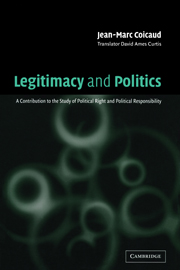Book contents
- Frontmatter
- Contents
- Translator's foreword
- Acknowledgements
- Introduction
- 1 What is political legitimacy?
- 2 Controversies around political legitimacy
- 3 Modernity, rationality of the social sciences, and legitimacy
- 4 Social sciences, historicity, and truth
- 5 Study of politics, relation to history, and de jure judgement
- 6 Community experience, dynamic of possibilities, and political legitimacy
- Conclusion
- Bibliography
- Index
4 - Social sciences, historicity, and truth
Published online by Cambridge University Press: 22 September 2009
- Frontmatter
- Contents
- Translator's foreword
- Acknowledgements
- Introduction
- 1 What is political legitimacy?
- 2 Controversies around political legitimacy
- 3 Modernity, rationality of the social sciences, and legitimacy
- 4 Social sciences, historicity, and truth
- 5 Study of politics, relation to history, and de jure judgement
- 6 Community experience, dynamic of possibilities, and political legitimacy
- Conclusion
- Bibliography
- Index
Summary
The way in which the social sciences interpret the historicity of their object explains in part the ambiguity – indeed, the elimination – at the heart of their explanatory efforts, of their recourse to value judgements that state what is and is not legitimate. In order to extract oneself from this situation, one must break away from a conception of science that inadequately accounts for the historical character of social and political phenomena and has negative consequences concerning the status of truth when it comes to studying the relationships between governors and governed.
In fact, if the social sciences do not integrate the dimension of judgement and of values, this is in particular because their description of the historical aspect of phenomena expresses an unhappy consciousness of the good. The inability of the scientific analysis of society to broach, in coherent terms, the thematic of political ethics and of the right to govern is tied to an inappropriate view of the historicity of social facts. This inability is apparent in three ways.
First, the study of societies strictly takes over as its own the explanatory logic of the sciences of nature. In this case, what it does is to subject social and political problems to an analysis that does not accord with their specificity. Taking this specificity into consideration is, however, one of the conditions for setting in place a study of the relationships between governors and governed that is conducted from the standpoint of legitimacy.
- Type
- Chapter
- Information
- Legitimacy and PoliticsA Contribution to the Study of Political Right and Political Responsibility, pp. 129 - 180Publisher: Cambridge University PressPrint publication year: 2002



